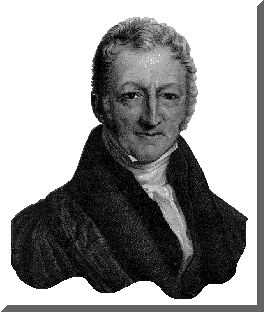This often quoted passage reflects the significance Darwin affords Malthus in
formulating his theory of Natural Selection.
What "struck" Darwin in
Essay on the Principle of Population (1798) was
Malthus's observation that in nature plants and animals produce far more
offspring than can survive, and that Man too is capable of overproducing if
left unchecked. Malthus concluded that unless family size was regulated,
man's misery of famine would become globally epidemic and eventually consume
Man. Malthus' view that poverty and famine were natural outcomes of population
growth and food supply was not popular among social reformers who believed that with proper social structures, all ills of man could be eradicated.
Although Malthus thought famine and poverty natural outcomes, the
ultimate reason for those outcomes was divine institution. He believed
that such natural outcomes were God's way of preventing man from being
lazy. Both Darwin and Wallace independantly arrived at similar theories of
Natural Selection after reading Malthus. Unlike Malthus, they framed his
principle in purely natural terms both in outcome and in ultimate reason. By
so doing, they extended Malthus' logic further than Malthus
himself could ever take it. They realized that producing more offspring
than can survive establishes a competitive environment among siblings, and that
the variation among siblings would produce some individuals with a slightly
greater chance of survival.
Malthus was a political economist who was concerned about, what he saw as, the
decline of living conditions in nineteenth century England. He blamed this decline
on three elements: The overproduction of young; the inability of resources to
keep up with the rising human population; and the irresponsibility of the lower
classes. To combat this, Malthus suggested the family size of the lower
class ought to be regulated such that poor families do not produce more children
than they can support. Does this sound familiar? China
has implemented a policy of one child per family (though this applies to
all families, not just those of the lower class).




